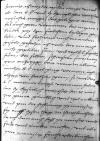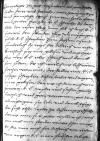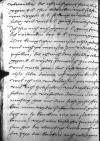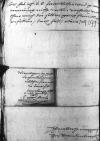E(uer) L(ieb) ⌊⌋ des dat(en) helt den ersten thag Iunii hab ich durch E(uer) L(ieb) secretarii den sibenden thag Iulii empfangen. Selchs E(uer) L(ieb) ⌊⌋ zum hochsten erfreudt sunderlich dy weyl her ⌊Ditherich von Rethen⌋ curtzlich pey mir gebesen und angezagt hat, wy E(uer) L(ieb) etbas schwach und kranck sein solten, / der ich warlich mit beschwerten hertzen vernome, / derhalben mir E(uer) L(ieb) istzigs ⌊⌋ dester lieber und angenemer gebesen, / daraus ich dan, / auch vom secretarii, / E(uer) L(ieb) wyder wolstehen gantz hertzlich und gern vernomen. / Gott dem almechtigen sey lobe und danck gesagt, das sichs alsot wyder zu besserung geschickt, damit mir, / so es Gottes wyllen ist, / noch einmal mir freuden enanter sehen mug(en).
Es hat mir auch her ⌊Ditherich von Rethen⌋ von wegen E(uer) L(ieb) einen hubschen debicht  AAWO, AB, D.96, f. 147v uberantbort, des ich mich gantz freuntlich gegen E(uer) L(ieb) thue bedancken. Wyl selchen von wegen E(uer) L(ieb) so lang er werdt, wehalten, / und umb E(uer) L(ieb) gantz freuntlich verdinen hidden by binding⌈[en]en hidden by binding⌉. Ich thue mich auch gegen E(uer) L(ieb) gantz freuntlich wedancken, das E(uer) L(ieb) meyner gegen ⌊alter koniglichen maiestet⌋ alsot gedacht und mich yr maiestet zum underthenigst pefollen, / des ich mich dan schuldig erkenn gegen E(uer) L(ieb) wyder freuntlich zuvordinen. Und wolt Gott, / das sichs umb mich alsot hilte, damit ich reythen kunthe, wol ich nit underlassen, ⌊yre maiestet⌋ und euch zu besuchen, / und wyl euch derhalben nicht verhalten, das mir der almechtig Gott aus dem betthe geholffen. Kan nun wyder stehen unnd gehen, doch an dy krucken nit von statenn komen. / Wyl aber trostlicher zuversicht sein. Got der almechtig werdt mich mit der zeyt der krucken auch erledigen,
AAWO, AB, D.96, f. 147v uberantbort, des ich mich gantz freuntlich gegen E(uer) L(ieb) thue bedancken. Wyl selchen von wegen E(uer) L(ieb) so lang er werdt, wehalten, / und umb E(uer) L(ieb) gantz freuntlich verdinen hidden by binding⌈[en]en hidden by binding⌉. Ich thue mich auch gegen E(uer) L(ieb) gantz freuntlich wedancken, das E(uer) L(ieb) meyner gegen ⌊alter koniglichen maiestet⌋ alsot gedacht und mich yr maiestet zum underthenigst pefollen, / des ich mich dan schuldig erkenn gegen E(uer) L(ieb) wyder freuntlich zuvordinen. Und wolt Gott, / das sichs umb mich alsot hilte, damit ich reythen kunthe, wol ich nit underlassen, ⌊yre maiestet⌋ und euch zu besuchen, / und wyl euch derhalben nicht verhalten, das mir der almechtig Gott aus dem betthe geholffen. Kan nun wyder stehen unnd gehen, doch an dy krucken nit von statenn komen. / Wyl aber trostlicher zuversicht sein. Got der almechtig werdt mich mit der zeyt der krucken auch erledigen,  AAWO, AB, D.96, f. 148r darmit ich wyder reythen muge unnd als dan E(uer) L(ieb) und dy ⌊kyniglichen maiestet⌋ wesuchen muge, / das gebe Gott amen. Hab auch gern vernomen, das meyne bruder pey den frolichen beylager gebesen, / und hetz umb mich ein andere gestalt gehapt, ich wolt darvon auch nicht gepliben sein, / und wyl Euer Lieb gepeten haben, / derselben / schwestern sone / mein grus anzuzeygen. Dan wann in allenn sambpt E(uer) L(ieb) wol ging, verneme ich alzeyt von hertzen gern. /
AAWO, AB, D.96, f. 148r darmit ich wyder reythen muge unnd als dan E(uer) L(ieb) und dy ⌊kyniglichen maiestet⌋ wesuchen muge, / das gebe Gott amen. Hab auch gern vernomen, das meyne bruder pey den frolichen beylager gebesen, / und hetz umb mich ein andere gestalt gehapt, ich wolt darvon auch nicht gepliben sein, / und wyl Euer Lieb gepeten haben, / derselben / schwestern sone / mein grus anzuzeygen. Dan wann in allenn sambpt E(uer) L(ieb) wol ging, verneme ich alzeyt von hertzen gern. /
So werden E(uer) L(ieb) nuemer lengst vernomen haben, das dy ⌊keyserlich maiestet⌋ den 25 Maii zw ⌊Genoa⌋ glucklich und wol ankomm(en), und pin der hoffnung, yr maiestet sey auff dysen thag in ⌊Theutzlanthen⌋, da ich dan auch hoff, yr maiestet werdt fridt und einikat machen / und alle yrer maiestet feinthe uberbinthen.
Des hab ich E(uer) L(ieb) freuntlicher und gutten mainung nicht wollen verhalten und thue mich derselben gantz freuntlich pefellen. /
 AAWO, AB, D.96, f. 147v uberantbort, des ich mich gantz freuntlich gegen E(uer) L(ieb) thue bedancken. Wyl selchen von wegen E(uer) L(ieb) so lang er werdt, wehalten, / und umb E(uer) L(ieb) gantz freuntlich verdinen hidden by binding⌈[en]en hidden by binding⌉. Ich thue mich auch gegen E(uer) L(ieb) gantz freuntlich wedancken, das E(uer) L(ieb) meyner gegen
AAWO, AB, D.96, f. 147v uberantbort, des ich mich gantz freuntlich gegen E(uer) L(ieb) thue bedancken. Wyl selchen von wegen E(uer) L(ieb) so lang er werdt, wehalten, / und umb E(uer) L(ieb) gantz freuntlich verdinen hidden by binding⌈[en]en hidden by binding⌉. Ich thue mich auch gegen E(uer) L(ieb) gantz freuntlich wedancken, das E(uer) L(ieb) meyner gegen  AAWO, AB, D.96, f. 148r darmit ich wyder reythen muge unnd als dan E(uer) L(ieb) und dy
AAWO, AB, D.96, f. 148r darmit ich wyder reythen muge unnd als dan E(uer) L(ieb) und dy 


